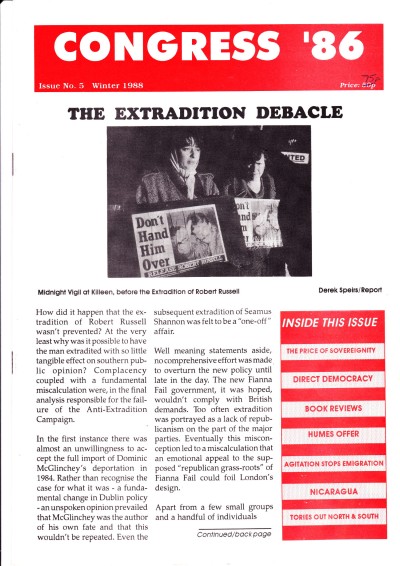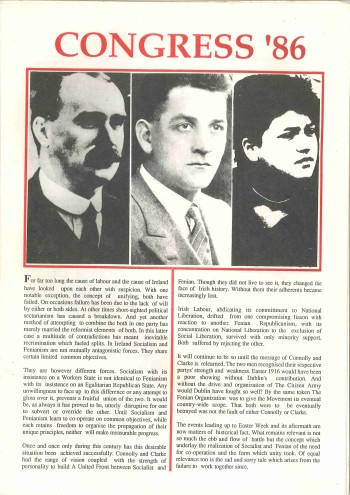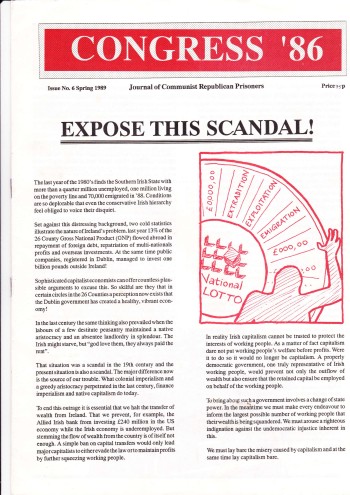Congress '86, No. 5

| Date: | 1988 |
|---|---|
| Organisation: | League of Communist Republicans |
| Publication: | Congress '86 |
| Issue: | Number 5 Winter 1988 |
| Type: | Publication Issue |
| View: | View Document |
| Discuss: | Comments on this document |
| Subjects: |
Please note: The Irish Left Archive is provided as a non-commercial historical resource, open to all, and has reproduced this document as an accessible digital reference. Copyright remains with its original authors. If used on other sites, we would appreciate a link back and reference to The Irish Left Archive, in addition to the original creators. For re-publication, commercial, or other uses, please contact the original owners. If documents provided to The Irish Left Archive have been created for or added to other online archives, please inform us so sources can be credited.
Commentary From The Cedar Lounge Revolution
13th June 2016
Many thanks to the person – they prefer to be called Master McGrath – who donated this and others documents to the Archive. It expands a section which has needed extra materials for quite some time.
The League of Communist Republicans was a group of Republican prisoners in H-Block who split with the Provisional IRA during the 1980s. As noted previously:
With the end of abstention by Sinn Féin at the 1986 Ard Fhéis there was a mass resignation of about 100 IRA prisoners in Long Kesh. Of this number a smaller group combined in November 1986 as the League of Communist Republicans. Their position was interesting since they argued that the armed campaign was of limited use at that point in time (and who better to know?) and that Sinn Féin was retreating from the left.
And:
One of those pivotal to the LCR was Tommy McKearney who developed their programme (reproduced, not quite in full due to missing pages, in the last pages of the PDF above):
WE STAND FOR: 1. An independent Sovereign Republic of All Ireland. 2. A Revolutionary Democratic Government, under the control of the Workers and the Small Farmers. 3. Administration of the State to be under the supervision of a National Assembly which practices Direct Participatory Democracy, ie deputies are subject to recall. THE STATE MUST GUARANTEE ITS CITIZENS: • Work at an acceptable wage. • A home suitable to the citizen’s needs. • An education to the highest level compatible with the citizen’s ability. • Full and comprehensive healthcare. • Social Rights including: Divorce Contraception and abortion Separation of Church and State Meaningful equality between the sexes. To allow the Workers’ and Small Farmers’ State exercise control, it is imperative that the commanding heights of the economy, Finance, Trade, Industry, Production and Communication, be brought under the Democratic control of the Revolutionary Democratic Workers’ and Small Farmers’ Republic.
Furthermore:
As can be seen this had deliberate resonances with the 1934 Republican Congress. Their slogan ‘A Workers’ and Small Farmers’ State’ was an attempt to remedy what they saw as the original error by Ryan and others at that Congress. And as a further echo of this their journal was named Congress ‘86.
This edition of that journal, dating from winter 1988, numbered 5, offers an excellent insight into their thinking during this period. In eighteen or so pages a considerable number of topics are covered including ‘The Price of Sovereignty’, ‘Direct Democracy’, Emigration, Nicaragua, Woman Against Poverty and a piece entitled ‘Tories out North and South’. The main article on the front page is on extradition, particularly that of Robert Russell. The piece on Direct Democracy extolls that form of political organisation suggesting that ‘we need direct participatory democracy because – Direct Participatory Democracy implements the Manifesto’. There’s a fascinating piece on the aftermath of the Sinn Féin-SDLP negotiations which argues that the ‘rift’ between the two parties ‘may not be unbridgeable’ and suggests that:
A reading of the document released by both parties at the end of the negotiations, shows clearly that on only two issues is there real disagreement. These concern the role of armed struggle and whether Britain is a neutral actor on the Irish scene’. Given the centrality of both of those elements to what would later be termed the Peace Process that appears prescient. In a not dissimilar vein theres a critical analysis of ‘Armed Struggle’, a pamphlet issued by the Communist Party of Ireland (part of the the text of which can be found here in the Archive).
There’s also an exchange in letters between a US based correspondent and a ‘reply from the H-Blocks’ on the nature of Congress ’86. This gives a good overview of the development of Congress ’86 from the early 1980s onwards and notes:
Ideologically, we moved away from the IRA/SF in the early 1980s. But the straw that broke the camel’s back and led us to sever our links was the Ard Fheis of 1986.
And it continues that:
…we believed there was the potential to broaden the struggle into the 26 Counties [on foot of the ‘mass movement’ of the Hunger Strikes campaign and after]… in short to agitate among the unemployed, the low paid and the small farmers. in shot agitate and organise for a Workers and Small Farmers Republic.
Sadly things were not taken in this direction. SF’s stranglehold stifled the growing activity of the people… the political movement drifted along into electoralist Social Democracy. The promotion of class consciousness was contemptuously pushed aside. Left Nationalism with its socialist rhetoric was in the ascendancy.
Interestingly the writer argues…
In principle we had no objection, nor have we now, to taking seats in Leinster House. …
And:
The use of physical force should be regarded as a tactic , not as a principle.
There is considerably more, including analyses as to why in their view the ‘Officials’ and IRSP ‘went wrong’ and criticisms as regards the Marxist characteristic of both.
In sum an important addition to the Archive. A number of questions remain. Did Congress ’86 find a political expression in terms of campaigning or other activities and when did it disband? Any insight into these questions would be very useful.


Comments
No Comments yet.
Add a Comment
Comments can be formatted in Markdown format . Use the toolbar to apply the correct syntax to your comment. The basic formats are:
**Bold text**
Bold text
_Italic text_
Italic text
[A link](http://www.example.com)
A link
You can join this discussion on The Cedar Lounge Revolution
By: roddy Thu, 16 Jun 2016 15:54:08
McFeeley was from North Derry.
Reply on the CLR
By: WorldbyStorm Thu, 16 Jun 2016 16:22:48
In reply to Mick the Miller.
If you ever found your way to scanning them the Archive would be very happy to post them up. Particularly the later ones. Sound very interesting.
Reply on the CLR
By: Seán Ó Murchadha Thu, 16 Jun 2016 17:31:24
In reply to roddy.
South Derry Group is what McKeown calls them. It doesn’t appear to be a formal title adopted by McFeeley & Co.
Reply on the CLR
By: Joe Thu, 16 Jun 2016 21:18:26
What’s the story with those 1916 Societies? Are they are particular brand of disso or what?
Reply on the CLR
By: Mick the Miller Sun, 19 Jun 2016 00:34:55
The Congress ’86 ‘Special Supplement’ that came with Issue 4 has an article entitled ‘Reject Pan-Nationalist Drift’ jointly signed by McKearney and McFeely.
Reply on the CLR
By: roddy Sun, 19 Jun 2016 08:57:06
As I said McFeely was in the league of communist republicans but it does’nt suit certain agendas to mention that now.
Reply on the CLR
By: Joe Sun, 19 Jun 2016 15:17:37
In reply to Mick the Miller.
That’s interesting. I assume their objection to ‘pan-nationalist drift’ was that they would see it as SF going soft.
The term pan-nationalist front was used by the then WP and the then Sindo and others just a few short years later as a term of denunciation for the Hume/Adams talks.
All were clearly wrong to denounce it. It led to the ceasefires and the Good Friday Agreement and the peace we have now.
Reply on the CLR